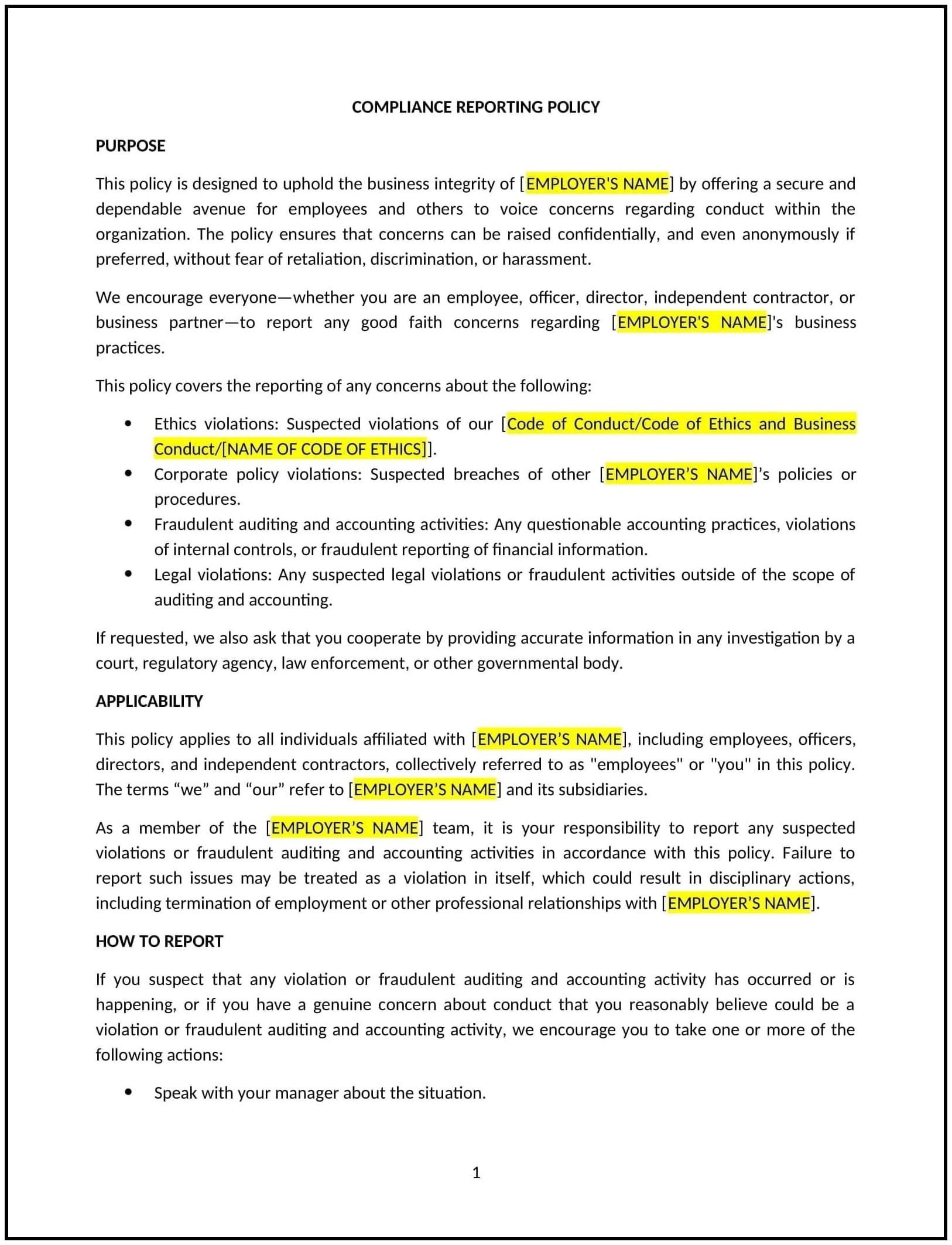Compliance reporting policy (Nebraska): Free template
Got contracts to review? While you're here for policies, let Cobrief make contract review effortless—start your free review now.

Customize this template for free
Compliance reporting policy (Nebraska)
A compliance reporting policy helps Nebraska businesses define the procedures for reporting violations of laws, regulations, or company policies. This policy outlines how employees can report issues related to compliance, the steps involved in addressing such reports, and the protections provided to individuals who report potential violations. It is designed to ensure transparency, encourage ethical behavior, and mitigate the risks associated with non-compliance.
By adopting this policy, businesses in Nebraska can create a clear and secure reporting framework that promotes ethical conduct, reduces the risk of legal issues, and protects the company’s reputation.
How to use this compliance reporting policy (Nebraska)
- Define what constitutes a violation: Specify the types of violations that can be reported, such as breaches of company policies, legal non-compliance, unethical behavior, or fraud.
- Set clear reporting procedures: Establish how employees should report compliance issues, including the methods available (e.g., anonymous hotline, designated reporting officer, online form) and any required documentation.
- Protect whistleblowers: Ensure that employees who report compliance issues are protected from retaliation, and outline the steps the company will take to ensure that reports are handled confidentially and impartially.
- Define the investigation process: Outline the process for investigating reported compliance issues, including who is responsible for conducting the investigation, the timeline for resolution, and how the findings will be communicated to the employee.
- Set consequences for non-compliance: Clarify the consequences of failing to report violations or engaging in retaliation against individuals who report compliance issues.
- Encourage timely reporting: Emphasize the importance of reporting issues promptly to mitigate risks and resolve potential compliance concerns quickly.
- Review and update: Periodically review and update the policy to ensure it remains aligned with Nebraska laws, business practices, and regulatory requirements.
Benefits of using this compliance reporting policy (Nebraska)
This policy provides several benefits for Nebraska businesses:
- Promotes ethical behavior: A clear reporting framework encourages employees to act with integrity and report any concerns without fear of retaliation, fostering a culture of ethical conduct.
- Protects the company’s reputation: By addressing compliance issues promptly and effectively, businesses can avoid legal and reputational risks associated with non-compliance.
- Reduces legal risks: A well-structured compliance reporting policy helps businesses identify and address potential violations before they escalate into larger issues, reducing the risk of costly legal consequences.
- Enhances transparency: A transparent reporting process helps build trust between employees and management, ensuring that employees feel comfortable reporting violations without fear of repercussions.
- Improves internal controls: Regularly reviewing and addressing compliance issues strengthens internal controls and ensures that the business is operating within legal and ethical boundaries.
Tips for using this compliance reporting policy (Nebraska)
- Communicate the policy clearly: Ensure that all employees are aware of the compliance reporting policy, how to report issues, and the protections offered to whistleblowers.
- Provide multiple reporting channels: Offer several ways for employees to report concerns, including anonymous options, to ensure that employees feel safe and comfortable reporting issues.
- Respond promptly: Address reported issues quickly and professionally, ensuring that employees know their concerns are taken seriously and will be handled appropriately.
- Protect confidentiality: Maintain confidentiality during the investigation process, ensuring that the identities of those reporting violations are protected.
- Regularly review the policy: Periodically assess the effectiveness of the policy, updating it as needed to reflect changes in laws, regulations, or company practices.